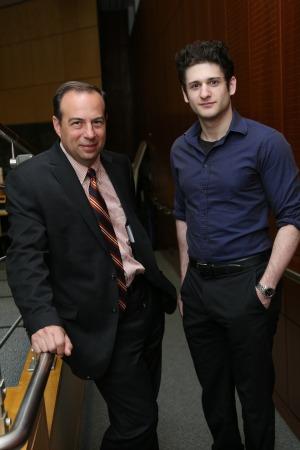Signed, Sealed, E-Delivered
Through Pro Bono Work, Columbia Law School Student Chase Mechanick '15 Helped the Queens County District Attorney's Office Secure a Novel Ruling Allowing Domestic Violence Victims to Electronically Sign Complaints
New York, March 3, 2015—When a New York criminal court judge ruled in January that a domestic violence victim can electronically sign a complaint against an alleged attacker rather than expose herself to further abuse by traveling to sign in person, she based her ruling in part on the research of Columbia Law School student Chase H. Mechanick ’15.
Mechanick began researching the use of e-signatures in domestic violence prosecutions in the fall of 2013 as part of a pro bono project for Scott E. Kessler, the domestic violence bureau chief in the Queens County District Attorney’s Office who oversees the Law School’s Domestic Violence Prosecution Externship. Kessler’s office is one of the best in the country based on its high conviction rate and successful prosecution of cases without victims’ cooperation. Kessler decided to pursue e-signatures as another measure of protection for victims who risk further attack if they must travel from a safe haven to sign a complaint in person.
Chase H. Mechanick '15, right, helped Columbia Law School Lecturer Scott E. Kessler, domestic violence bureau chief of the Queens County District Attorney's Office, research a novel issue: whether domestic violence victims can electronically sign complaints against their alleged attackers. |
Queens Criminal Court Supervising Judge Deborah Stevens Modica adopted the reasoning Mechanick helped develop in a ruling on Jan. 28. The judge decided against the defendant in the case whose attorney argued specific legislation was necessary to allow e-signatures in domestic violence prosecutions.
Her ruling may be the first of its kind in the country.
“In our everyday lives, we order things electronically and pay for them without handwritten signatures; we hit a ‘confirm’ button to communicate our wishes electronically in all manner of transactions,” Modica wrote. “To assert that the everyday use of technology in business transactions, government filings, test taking, school transactions, etc. cannot be applied to court documents without specific legislative authorization fails to recognize that such usage is simply no longer novel.”
There was no solid precedent for Mechanick to rely on when he initiated his research because of the novelty of the technique in the criminal context.
“It was a little bit difficult at first,” said Mechanick. “It was completely uncharted territory. I had to look for whatever I could find, anywhere in the law, and anticipate any objections people might have.”
The closest parallel was the use of electronic tickets for traffic violations and some examples of electronic signatures in civil cases.
“Eventually, one case leads to another and when they all start citing each other, you know you’ve hit something relevant,” Mechanick said.
He said his courses at the Law School have helped him develop the skills necessary to tackle tough questions.
“Law school is great for developing legal instincts—not just legal knowledge,” he said. “In order to assess whether an authority is relevant, you need to have good instincts: How would a judge look at it, how would lawyers look at it? That’s not something that can be learned in a textbook. It can only be taught with good professors.”
Kessler said Mechanick’s work was invaluable. After he started on the project, other students, including from other law schools, continued the work in the months leading up to the January ruling.
“When people ask what good pro bono hours do, this is the kind of good they can do,” Kessler said.
Laren E. Spirer, director of pro bono programs at Columbia Law School’s Social Justice Initiatives, agreed.
"Pro bono can provide an educational opportunity for students and help busy practitioners take on work for which they may not otherwise have the capacity," she said. "Under the supervision of attorneys in the field, our students are able to do pro bono work that both aligns with their personal and professional interests and makes a significant impact."
Mechanick, who plans to pursue a career in tax law, did some pro bono work with victims of domestic violence as a summer associate at Akin Gump Strauss Hauer & Feld. His mother is a family law attorney who has worked with domestic violence victims in the past. He said the e-signature case was an important one.
“Ultimately, the law is a service industry,” he said. “It’s a client-centered industry. You don’t really get that perspective until you look a client in the eye and shake her hand.”
